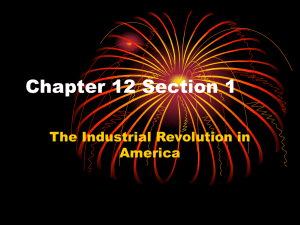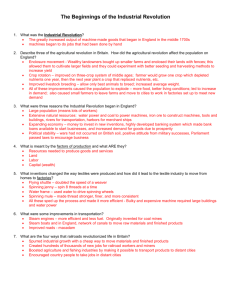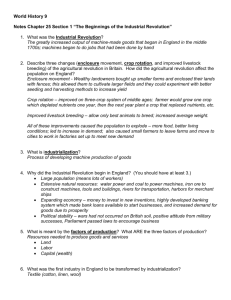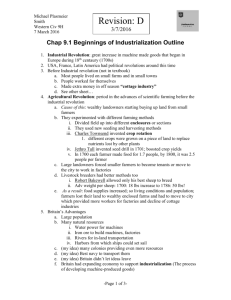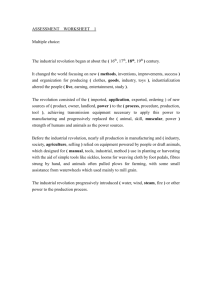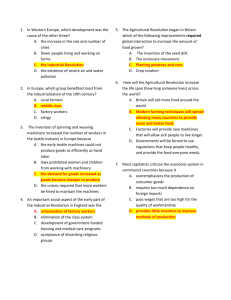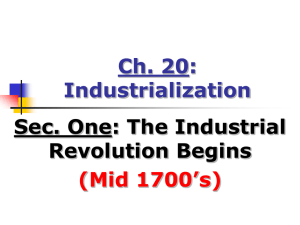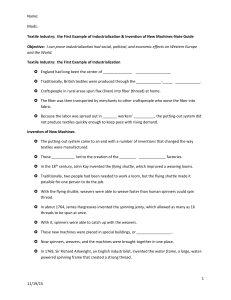Industrial Revolution
advertisement
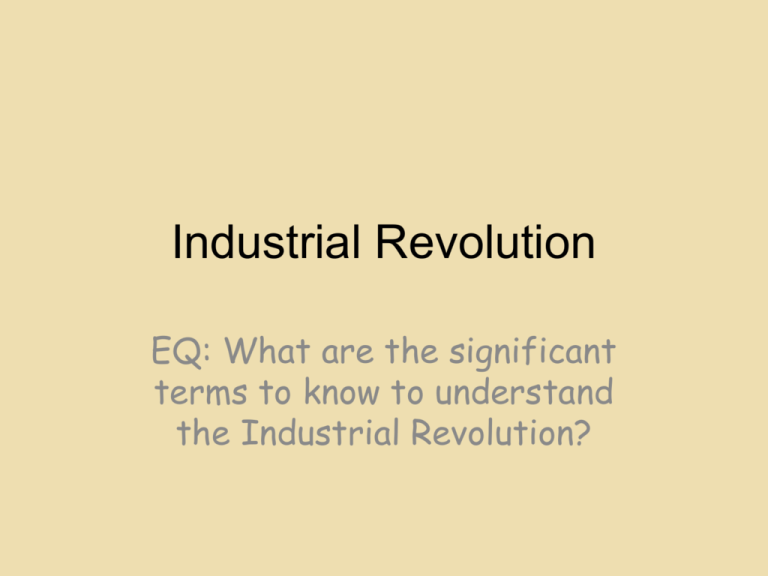
Industrial Revolution EQ: What are the significant terms to know to understand the Industrial Revolution? 1. Industrial Revolution • Sudden acceleration of technological and economic development that began in Britain in the 18th century and spread throughout the world • Traditional farming economy replaced by an economy dominated by machinery and manufacturing • Transferred political power away from the landowner to the industrial capitalist and created an urban working class Industrial Revolution http://www.teacherlink.org/content/social/instructional/industrialrevolution/home.html 2. Agricultural Revolution • Period of time between the 18th and 19th centuries which saw a massive and rapid increase in agricultural productivity and vast improvements in farm technology http://www.xtimeline.com/evt/view.aspx?id=632231 2. Agricultural Revolution • Better food supply – – – – – Larger farms Crop rotation Synthetic fertilizers New machines Displacement of farm workers • Many went to to the cities looking for factory jobs http://www.passionistsisters.org/about/history-of-the-passionist-sisters/ 3. Crop rotation • Practice of growing different crops one after the other on the same land to keep the land as productive as possible • Increased food supply was a prerequisite (requirement) for industrialization y.com/Articles/233/Ghttp://www.gardenalitarden-Types/Food-Gardens/Vegetable-Garden-Crop-Rotation/default.html 4. Industry • Economic activity focused on manufacturing (making things) http://lifeboat.com/ex/flexible.automated.manufacturing 5. Textiles • Cloth • Textile industry (manufacturing of cloth) was the first industry to industrialize. http://www.textilefromturkey.com/2012/10/06/turkish-textile-company-invest-textileproject-dagestan/ Inventions in Textile Machinery Several inventions in textile machinery occurred in a relatively short time period during the Industrial Revolution. •1733 Flying shuttle invented by John Kay - an improvement to looms that enabled weavers to weave faster. •1769 •1770 •1773 •1742 •1764 The Hargreaves Cotton Spinning Water first frame mills all-cotton jenny patented patented were invented invented first textiles the by opened water by Richard Spinning were James frame. inproduced England. Arkwright Hargreaves Jenny. -factories. the- the first powered machine textile to improve machine. •1779 Arkwright Crompton invented thethe spinning mule thatinallowed forfirst greater control over theupon the spinning wheel. weaving process. Several inventions in textile machinery occurred in a relatively short time period during the Industrial Revolution. •1733 Flying shuttle invented by John Kay - an improvement to looms that enabled weavers to weave faster. •1742 Cotton mills were first opened in England. •1764 Spinning jenny invented by James Hargreaves - the first machine to improve upon the spinning wheel. •1764 Water frame invented by Richard Arkwright - the first powered textile machine. •1769 Arkwright patented the water frame. •1770 Hargreaves patented the Spinning Jenny. •1773 The first all-cotton textiles were produced in factories. •1779 Crompton invented the spinning mule that allowed for greater control over the weaving process. 6. Entrepreneurs • People who organize, operate, and assume the risks of a new business. • Modern examples include Bill Gates, Steven Jobs and … http://www.123rf.com/photo_13779218_dark-chalkboard-with-the-word-entrepreneurillustration.html • The Industrial Revolution that occurred in Europe during the 19th century was of great importance to the economic future of the United States. • (1) transportation was expanded • (2) electricity was effectively harnessed • (3) improvements were made to industrial processes. Industrial Revolution Inventors Person Invention Date James Watt First reliable Steam Engine 1775 Eli Whitney Cotton Gin, Interchangeable parts for muskets 1793, 1798 Robert Fulton Samuel F. B. Morse Elias Howe Regular Steamboat service on the Hudson 1807 River Telegraph Sewing Machine 1836 1844 Improves and markets Howe's Sewing Machine 1851 Transatlantic Cable 1866 Telephone 1876 Phonograph, Incandescent Light Bulb 1877, 1879 Nikola Tesla Induction Electric Motor 1888 Rudolf Diesel Diesel Engine 1892 Orville and Wilbur Wright First Airplane 1903 Model T Ford, Assembly Line 1908, 1913 Isaac Singer Cyrus Field Alexander Graham Bell Thomas Edison Henry Ford 7. Factory System • An efficient combination of workers and powerdriven machinery that replaced cottage industry and the craftsmen • Manufacturing of textiles was the first industry to change. http://auto.howstuffworks.com/under-the-hood/auto-manufacturing/automotiveproduction-line.htm 8. Urbanization • Process in which an increasing percentage of the population lives in cities • An effect of industrialization • From 1800-1850 a significant increase in the number and size of cities in Europe and in the United States http://urbantimes.co/2012/07/urbanization-is-not-the-problem- / dealing-with-it-is 9. Capitalism • An economic system that focuses on individual ownership of wealth and property 10. Adam Smith • 18th century Scottish economist • Wealth of Nations attacked mercantilist ideas • Supported laissez-faire – Economy should be left alone to regulate itself by its own natural laws. – Laws of supply and demand control prices. 10. Adam Smith • People should be free to pursue their economic selfinterest. • Government should be a passive policeman in regulating the economy. 11. Socialism • Economic theory believing that there should be common ownership of all property. • Includes common ownership of factories, railroads, and infrastructure • Founder – Karl Marx Karl Marx 12. Labor Union • Organization of workers • Created to protest the working conditions within the original factories • Successes included: – 8-hour working day – Minimum wage – End of child labor
